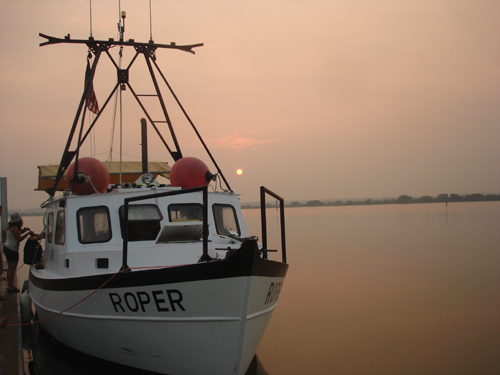
LAMP used the research vessel Roper, on loan from the Institute of Maritime History, during its June field school, when a team of archaeologists, college students, and volunteers excavated an 18th century shipwreck and raised two cannons.
A few weeks ago, while on the research vessel Roper while conducting shipwreck survey offshore the Matanzas Inlet, I participated in a phone interview with a writer from St. Augustine Underground. She had wanted to write an article on archaeology and treasure hunting in St. Augustine. I immediately saw red flags when I first heard this, as the confusion between these two contradictory practices is a common misunderstanding among members of the public. Underwater archaeology is very different from treasure hunting. The former involves systematic scientific investigations of shipwrecks or other maritime sites to seek knowledge about the past, while the latter is concerned with salvaging shipwrecks in search of materials that can be sold for a profit. Careful recording, documentation, and forensic analyses–procedures which cost time and money and prevent archaeology from being a profitable venture in a commercial sense–ensure that as a site is literally destroyed through excavation, scientists can maximize the amount of knowledge gained which can be received in no other way. Over the last few decades treasure hunting in Florida has, alas, resulted in the loss of a vast amount of knowledge that could have been saved, if archaeology had been conducted.
“The objects to us aren’t as valuable as the context,” he said. “Treasure hunters typically don’t give a damn about this. They care about the shiny stuff.”
For archeologists, the sole purpose of finding artifacts is to learn more about the people who used them. They are strongly against the selling of any artifacts no matter if it’s gold coins or a chipped dinner plate. Archeologists are after information, not objects.
On the other hand, it’s common knowledge that treasure hunters are in the business to make a profit or simply grow their personal collection. And they are frowned upon by archeologists.
“Treasure hunters are typically not interested in information,” Meide said. “They’re interested in stuff.”
In the State of Florida, treasure hunting is legal. However, the waters off St. Augustine are one of only four areas in the state off limits to treasure hunters. These state-protected archeological reserves are only available for extensive, systematic archeological research projects.
“When an archeologist is digging on a shipwreck, we are literally destroying that shipwreck,” Meide said. “We take that as a commitment to record what we’re doing as carefully as possible.”
“[Treasure hunters] are destroying a shipwreck just like we are but not in a way where we can learn anything at all. That has resulted in such a loss of information,” he said.
Click here to read the entire article on St. Augustine Underground.

